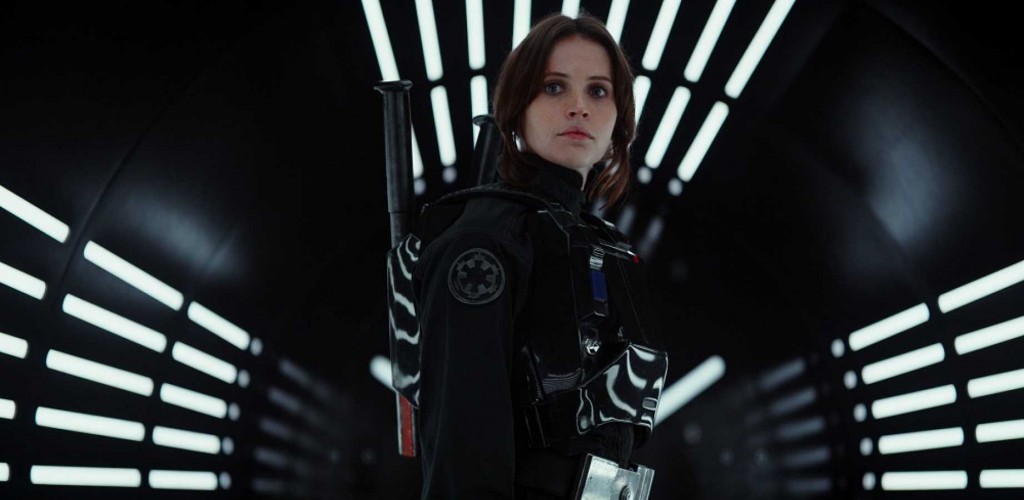-
Recent Posts
- Better Call Saul: There Are No Happy Endings between a “Rock and Hard Place”
- Black Widow Keeps It in the Family for Natasha’s Last Ride
- Loki Finds New Purpose in the Man behind the Mischief
- In its Debut, Star Wars: The Bad Batch Decides Whether to Obey or Rebel
- Nomadland: A Film Out of Time, For Our Times
Archives
Recent Comments
- Ed Clarke on Contact
- Matt on Why “The Frying Game” Is a Dark Horse Contender for The Simpsons’s Worst Episode Ever
- Lilly Dow on Contact
- Stacey on Veep’s Series Finale and the Hollowness of Getting What You Want
- Evan Jaocbs on Contact
Meta
Tag Archives: Star Wars
How Guardians of the Galaxy Vol. 2 Rebukes Star Wars and Harry Potter
Caution: This article contains major spoilers for Guardians of the Galaxy Vol. 2.
One of the best things about storytelling is that it offers a chance to walk in another person’s shoes, to step outside of oneself and have experiences that are not possible in most people’s day-to-day lives. But films, television shows, and novels also offer fantasy; they offer escapism and the chance to live out an existence, in two-hour chunks, that is wilder and more fantastical than our own. Some of our culture’s most prominent stories present a particular, alluring version of that idea — the fantasy of the ordinary person discovering that they are, in fact, more special than they ever could have known.
When Luke Skywalker gazes out at the twin suns of Tatooine, the sight evokes his longing for adventure, the unshakable feeling that the universe has more in store for him than just the inner workings of a moisture farm. When we meet Harry Potter living under the thumb of the Dursleys, it’s to establish the lowliness of his position, the improbability that the boy who lives under the stairs could, in reality, be the chosen one. And Guardians of the Galaxy Vol. 2 presents its own orphan protagonist in Peter Quill who, after a lifetime of hoping and wondering, discovers that he too is more powerful and unique than he had ever imagined.
Star Wars Rebels: The Melancholy Tones of Obi Wan and Darth Maul’s Shared Destiny in “Twin Suns”

The natural inclination in an episode like this one is to go big, to make the proceedings grand and explosive and exciting. It’s the Original Trilogy meeting the Prequel Trilogy meeting Star Wars Rebels, and so the powers that be could be forgiven for turning the whole thing into an epic confrontation, full of piss and vinegar and force-aided fireworks.
Instead, “Twin Suns” is a quieter, deliberate, almost melancholy episode. That’s a bold choice and one that pays off. Instead of a tribute to the pulpy thrills of the old serials that inspired George Lucas, the episode feels like an homage to the more languid tragedies in the Akira Kurosawa Samurai movies that also influenced him. The result is one of Rebels’s most meditative, understated episodes, that uses that ruminative tone to do justice to the major figures it invokes.
Posted in Television
Tagged Darth Maul, Episode Reviews, Ezra Bridger, Obi Wan Kenobi, Science Fiction, Star Wars, Star Wars Rebels
1 Comment
Rogue One Fills in the Gaps of the Star Wars Universe, But Rarely Comes into its Own
A New Hope, The Empire Strikes Back, and Return of the Jedi are the sacred texts of the Star Wars universe. Every bit of Star Wars that has emerged in the wake of those first three films – sequels, prequels, midquels, comics, T.V. shows, holiday specials, video games, trading cards, action figures, and commemorative plates – is indebted to the franchise’s holy trinity. And each of them no matter what their claim to originality or expansion, echoes, references, and yes, even rhymes with those instigating incidents. For as wide and wooly as the famed galaxy far far away has become over the years, the creators and collaborators who work in Star Wars are forever filling in the gaps left by those all-important lodestones of the franchise.
Rogue One: A Star Wars Story is the peak of this gap-filling mentality brought to bear. The film is inextricably tied to Episode IV, taking great pains to connect the events depicted in this movie with those of its hallowed predecessor, even when it gets in the way of telling Rogue One’s own story. Because of that, Rogue One comes off more like pandering than as a novel extension of the Star Wars universe. It’s a film desperate to remind you of what comes next in the timeline, without regard for whether any of the harbingers it presents genuinely add anything to the story being told here and now or the story we already know.
Posted in Movies, Sci-Fi Movies
Tagged Baze Malbus, Bodhi Rook, Cassian Andor, Chirrut Îmwe, Jyn Erso, K-2SO, Star Wars, Star Wars Anthology Films
4 Comments
What The Supreme Court and The Jedi Council Have in Common
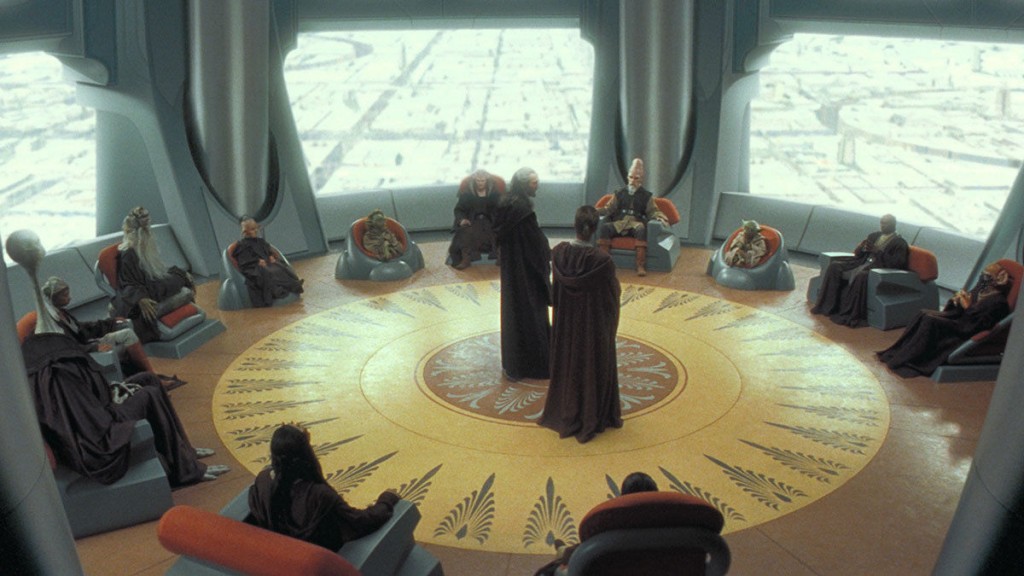
Adam Gopnik recently wrote about “Lessons for the Supreme Court from the Jedi Council.” In that article, he puts forward the idea that just as the denizens of the Star Wars universe “seem[] to have an undue cultural investment in the wisdom of the Jedi Council, even in the face of its ineptitude,” so to do Americans unduly venerate a Supreme Court whose inner workings appear “more like the manufacture of after-the-fact rationales designed to give the appearance of footnoted legalism to what are, in truth, the same ideological passions that have the rest of the country in their grip.” Gopnik disclaims the concept of textual interpretation, maintaining that our nation’s highest judicial body resembles its intergalactic counterpart in how it “seems to be functioning on guesswork and mutual hypnosis more than actual expertise.” Accordingly, he concludes that neither the Jedi Council nor the Supreme Court should be afforded nearly so much deference or respect.
The question becomes whether these two august bodies are enough alike to justify such a comparison or conclusion. There are certainly similarities between the two. In The Phantom Menace, the Jedi Council decides, after much deliberation, that Anakin Skywalker should not be trained in the ways of The Force. But Qui Gon Jin (and later Obi Wan Kenobi in his stead) defy that order and decide to teach the boy anyway. In the real world, after the Supreme Court held that same-sex marriage was a right under the Constitution, Texas’s Attorney General soon thereafter announced that despite that decision, under his interpretation Texas officials did not have to abide by the ruling. In both the Star Wars universe and our own, prominent officials have taken Gopnik’s advice to heart and feel free to ignore the high court’s decisions.
Posted in Movies, Sci-Fi Movies
Tagged George Lucas, Law, Star Wars, The Jedi Council, The Supreme Court
Leave a comment
Star Wars: The Force Awakens Is Like a Great Cover Song
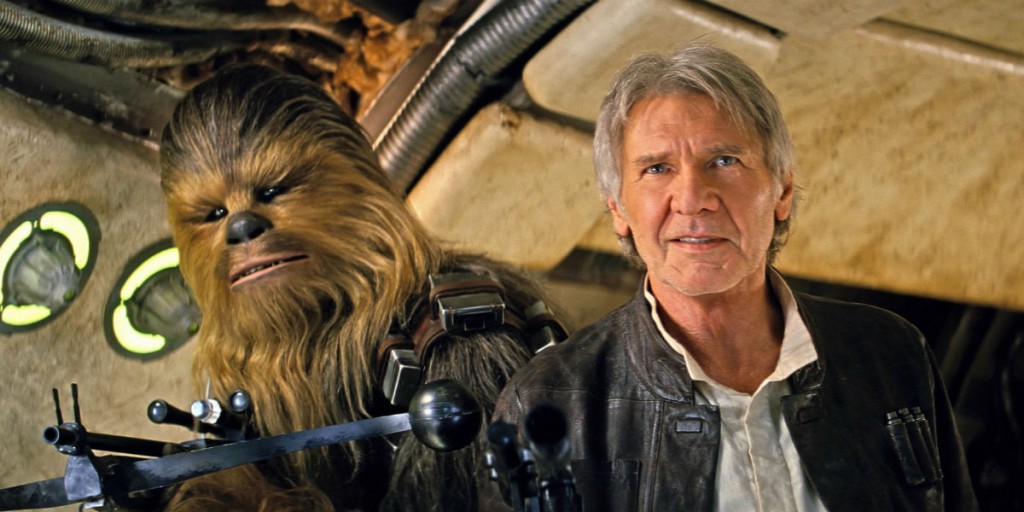
CAUTION: This review contains major spoilers for Star Wars: The Force Awakens.
I had a phase as a teenager where my musical tastes veered toward covers: punk rock versions of old standards, acoustic covers of hard rock classics, and even orchestral arrangements of Top 40 hits. The blend of the foreign and familiar appealed to me at a time when my taste in music was just beginning to expand. When an artist takes another’s work and puts their own spin on it, transforming what a song means or how it works at an emotional level by filtering it through a different lens, the end result can be both compelling and approachable.
The Force Awakens is, essentially, J.J. Abrams’s cover of A New Hope. That’s not a knock. It’s a superb cover, that hits the right notes while still creating something new, and it stands as a genuine achievement that’s all the more notable in light of the franchise’s prior missteps.
Star Wars: The Phantom Menace Is a Cold, Empty Film in a Series Known for its Richness, Excitement, and Warmth
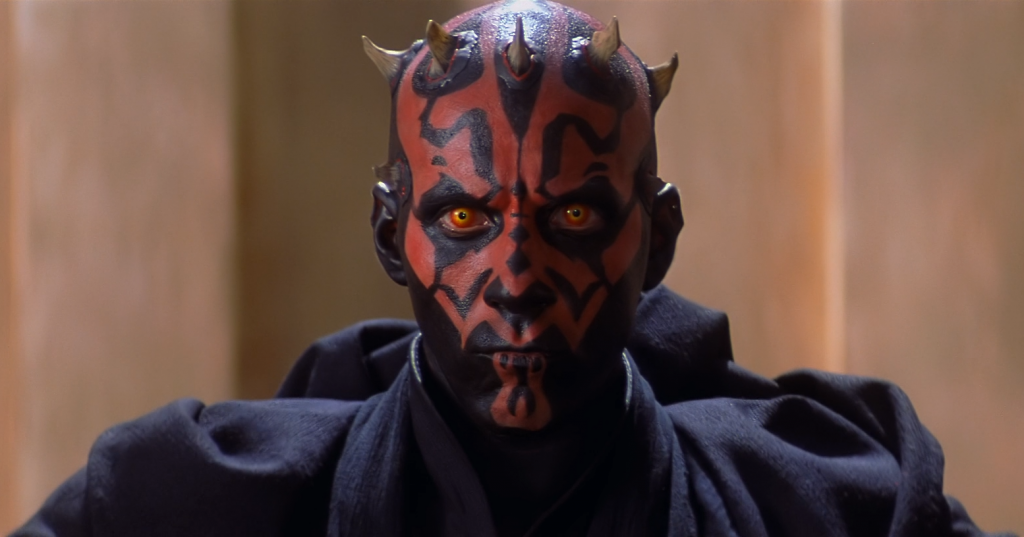
The internet is the land of hyperbole. Everything is either the greatest event in the history of the world or the worst thing to ever happen. So when it came time to watch The Phantom Menace–arguably the most maligned of the already ill-regarded Star Wars prequels–I approached it with optimism. I didn’t love the film when I saw it at twelve, but I didn’t hate it either. Surely the case against it was overstated. Surely there was a charitable interpretation to be made. Surely it couldn’t be that bad.
And then it was.
Make no mistake — The Phantom Menace is an awful film. It’s not the blight on the soul of cinema that its most ardent detractors would have you believe, but it’s not a good movie. In truth, somewhere past the halfway mark, Episode I manages to settle into a groove of mere okayness. There’s a good portion of the film that, separated from the ardor and expectations that come with the Star Wars appellation, would fall into the voluminous “fine but forgettable sci-fi adventure” category, never to be spoken or thought of again.
Unfortunately, The Phantom Menace does labor under those expectations, and the worst elements of the film are front-loaded. The racial stereotypes, the parliamentary procedure, and the bad child acting are all at the forefront in the early going of Episode I. At some point, the movie stumbles its way into a decent-if-unremarkable story about bucking authority and making peace with longstanding rivals to face a common enemy. But it’s a long slog to get there without nearly enough of a payoff.
Star Wars: a Hero Falters when The Empire Strikes Back
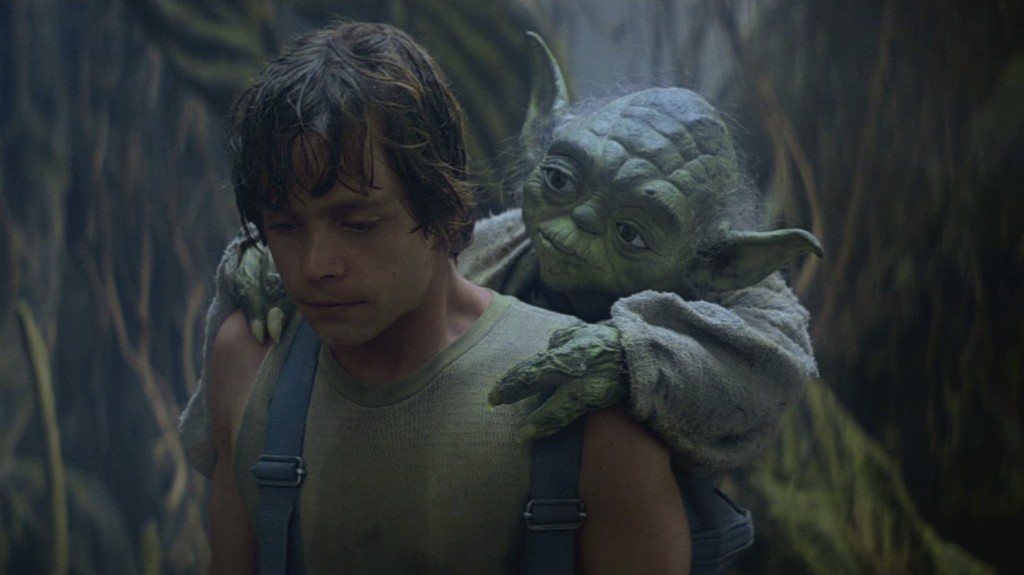
The Empire Strikes Back has a reputation for being the darkest of the Star Wars films. In contrast to the triumphant mood at the end of A New Hope, Empire closes with our heroes having been thoroughly defeated and left scrambling. Han is frozen in carbonite, placed in the hands of a bounty hunter, and ferried to the crime boss he’s been trying to avoid for two films. Luke fails in his quest to neutralize Darth Vader and has his hand sliced off for the trouble. What’s more, he learns not only that the man he loathes most in this world is his father, but that the people he trusted–the ones who guided him on this journey–have misled him. And Leia, Lando, Chewbacca, C3PO, and R2-D2 are all lucky to escape with their lives after being imprisoned, strangled, torn apart, and dragged through the muck.
The title “The Empire Strikes Back” could easily have been a simple marketing ploy, something that looked good on movie posters and sounded cool enough to rev up Star Wars’s legions of fans. Instead, it became an animating principle for the film. Empire contrasts the unexpected blow struck by the Rebels in the first film, with the measured counterpunch delivered by The Empire in the second. The ending of Empire sent the message that this would not be the type of series of films where the good guys win every time just because they’re the good guys.
But there’s much more to the movie than that darkness. It’s easy to judge Empire based on where the characters are at the end of the movie, but the route the film takes to bring them to that point is not so much dark as it is meditative, not so much bleak as it is serious, and, if I’m being honest, a bit more uneven in the effort than its predecessor.
Star Wars: The Balance of the Grand and the Intimate in A New Hope
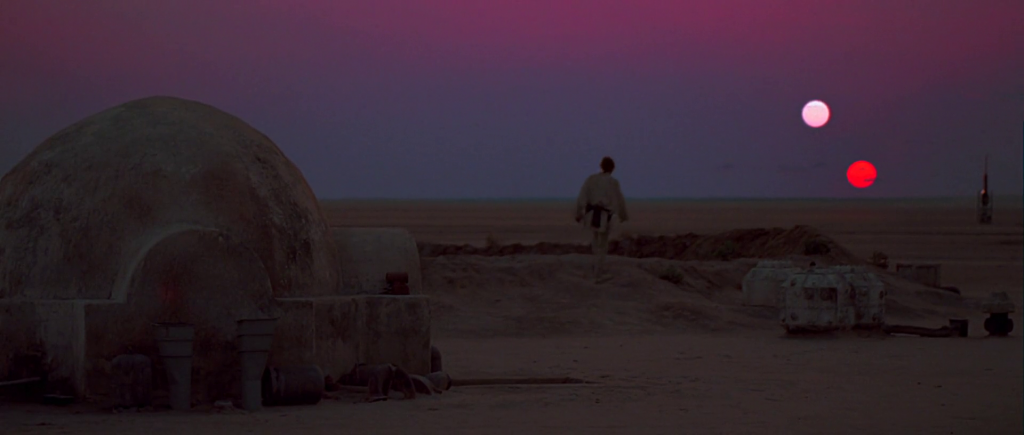
Of all the memorable visual flourishes in the original Star Wars, there are two images that stand out. The first is arguably the most iconic — Luke Skywalker, gazing off at the horizon, as the twin suns set on Tatooine. It represents the promise of adventure, the enormous world that waits beyond the garden gate, and serves as the prelude to his epic journey.
But the second is much simpler. It’s Luke, Leia, and Han, arm-in-arm and filled with joy, as they celebrate their victory over the Empire back at the rebel base. That moment underlines their unlikely friendship, borne out of shared struggles and triumphs, and shows the film’s heart, clearly felt even in the midst of this grand adventure. That contrast is what Star Wars, at least in its original form, comes down to, and what makes the film still so salient and impressive nearly forty years after its release.
The 5 Greatest Captains in Outer Space
Space…the final frontier. Only a brave few have had the courage, the fortitude, and the SAG cards to lead a crew into the far reaches of the universe. We here at The Andrew Blog decided to salute the five finest on-screen captains to ever command a space-faring vessel. There were only two simple rules: 1. The characters had to be in charge of their ships, whether they formally held the title of captain or not. 2. Only one captain per franchise; one of the biggest problems on spaceships is overcrowding. With those grand limits in place, we present to you the five best captains that the galaxy has to offer.
Posted in Movies, Sci-Fi Movies, Television
Tagged Admiral Adama, Battlestar Galactica, Captain Picard, Firefly, Futurama, Han Solo, Leela, Mal, Star Trek, Star Wars, Whedon
4 Comments


